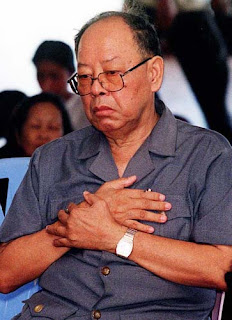Former Khmer Rouge Minister Appears Before Cambodian Court
Former Khmer Rouge foreign minister leng Sary appeared before Cambodia's genocide tribunal to press for his release from pretrial detention. He is one of five defendants being held by the so-called Extraordinary Chambers in the Courts of Cambodia, set up to try the former leaders of the ultra-Maoist group for crimes against humanity. Rory Byrne reports for VOA from Phnom Penh.
His lawyers said that he is too old and frail to pose a flight-risk or to threaten potential witnesses, and asked that he be placed under house arrest until his trial begins, probably next year.
Leng Sary is charged with crimes against humanity, committed during the brutal 1975-1979 rule by the Khmer Rouge, when almost two million people died from starvation, disease, overwork and execution.
Known as 'Brother Number Three' in the organization's secretive hierarchy, he was deputy prime minister as well as foreign minister of Democratic Kampuchea, as Cambodia was renamed by the Khmer Rouge. Using his position, he encouraged thousands of Cambodians living abroad to come home. Almost all were later executed.
Youk Channg is the director of the Documentation Center of Cambodia, which is compiling evidence on the Khmer Rouge regime ahead of the upcoming trials.
"He is sort of the international face of the Khmer Rouge, out there [to] convince the world, and the West, to believe that the regime was a success and was good for the country," said Channg. "His mission [was] to bring Cambodians abroad back to the country to help build the revolution - and usually [the] people ended up executed."
leng Sary was given an amnesty by the government in 1996 as a reward for breaking with the Khmer Rouge, along with hundreds of his supporters. Until his arrest last year, he lived in a palatial villa in the capital Phnom Penh, earning a small-fortune from gold and precious-stones interests.
Youk Channg says his prosecution is seen as particularly important for many Cambodians.
"He [was] the untouchable Khmer Rouge leader that has been protected by the government, given amnesty by the kings, and have so much money," said Channg. "So for all of us who is the victims having him arrested makes a huge difference."
leng Sary is one of five defendants being held by the tribunal, which plans to begin its first trial later this year. His wife, 76-year-old Ieng Thirith, who served as the Khmer Rouge's social affairs minister, is also being held on charges of crimes against humanity.
A decision on leng Sary's appeal is not expected for a couple of weeks. Similar appeals by other defendants have been rejected.

